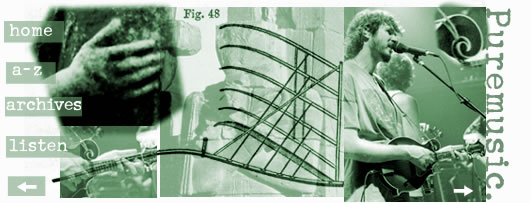
A CONVERSATION WITH DREW EMMITT (continued)
PM: Are the Salmon records self-produced, or on a label?
DE: The first two are self-produced. Bridges to Bert and Ask the Fish we put out ourselves. Then we were courted by a number of labels, seven or eight of them. We went with Hollywood Records. The next two, Euphoria and The Nashville Sessions, were on Hollywood. Then they decided that we weren't going to be the next one hit wonder, and that was that.
PM: Who are they, Hollywood? I don't know anything about them.
DE: They're owned by Disney. It's interesting what happened to Hollywood. When we signed with them, they had a really great staff, and we had a really good feeling about them. Right when our first record came out with them, almost everybody at the label got fired or left. They completely changed personnel, and our connection disappeared, got lost. They sure didn't know what to do with us. We did okay, but it could have been so much better. Especially with The Nashville Sessions, we were hoping for a whole lot more.
PM: That record had such a beautiful angle, so promotable under the circumstances. Bluegrass band turned major jam band goes to Music City to record with the heavies, come on.
DE: We thought so, too. But that's just the way the record business is. People don't stay around long. That's another thing I really like about Compass, it's a really solid staff that seem happy doing what they're doing, and the team stays together.
PM: It's a more familial feel over there. In light of that Hollywood shakeup, did The Nashville Sessions or Euphoria get much airplay?
DE: Yeah, some. They each had a couple of tunes that got some play.
PM: But I'll bet your airplay on Freedom Ride already exceeds what those albums received, is that right?
DE: Absolutely.
PM: There's nothing like a little record company working hard, when you're talking about Americana radio, at least.
DE: To me, they're already doing way more with their small staff than we saw out of Hollywood.
PM: And it's so much about matching your record to what it is they do. You're right up their alley, they can really sell you.
DE: And now, because of this solo record, they've also signed Leftover Salmon. They're going to put out our new live record. That's a really cool development.
PM: Right. It sounds like Leftover Salmon is a very democratic setup, is that correct? So the band is really behind the Compass move.
DE: Yes, on both counts. At first, we'd thought we would put it out on our own, but after my dealings with Compass, I brought the idea to the band to rethink our plan. They would do so much more with our record than we could ever dream of, you know.
PM: And they've already greased the slide with your release, might as well enjoy the ride, kind of thing. Feels more like a campaign.
DE: Exactly, it helps both records.
PM: So, it was Barron Ruth that brought the deal with Compass about, then?
DE: Definitely. He had [co-owner] Gary West call me. Without a manager to do the deal, we just talked informally into an arrangement. We didn't even sign a contract until the record was almost finished. That would obviously never have happened with a major label.
PM: Right. First the shackles, then the shekels. I see that the title cut is from The Hooters gang. [For those who are unfamiliar, a popular band from Philly in the 80s and 90s that featured super songwriters Rob Hyman and Eric Bazilian, who wrote a number of hits for other people, including "Time After Time" for Cyndi Lauper, "What if God was One of Us" for Joan Osborne, and many others.]
DE: That's a record that John dug up, and we were doing it on the tour together last fall.
PM: What record is that from?
DE: I don't know, exactly. It's not a Hooters song per se, but written by their writers. [We think it's from a great side project called Largo.] John's a master of digging out great songs from a wide range of places, and making them his own. What surprised me was when he said, "You wanna put 'Freedom Ride' on the record"? [when he could have "kept" it for his next CD instead]. So, yeah, I was happy to include that, we already liked the song a lot. And later it became the title of the record. That was a gift.
PM: Yeah, those guys are some of my favorite songwriters, for sure. I love that instrumental, "Paving Eisenhower." Jeff Autry is really tearing it up on that one, along with the rest of you. I appreciate when people put the blue in Bluegrass, it really funks it up.
DE: Thanks, I like that, too. continue
print (PDF) listen to clips puremusic home